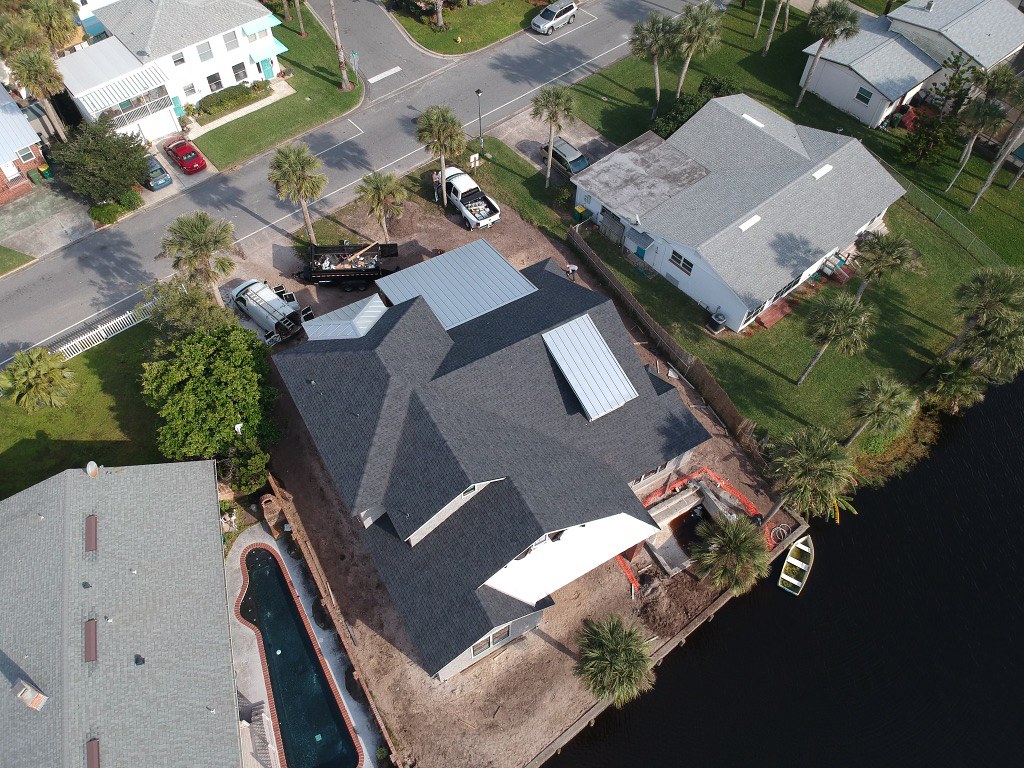When it comes to home construction, the roof plays a crucial role in the overall energy efficiency of the property. Many homeowners focus on insulation, heating, and cooling systems, but often overlook the impact that residential roof construction can have on energy savings. A well-designed roof can help regulate indoor temperatures, reduce reliance on heating and cooling systems, and ultimately lower energy bills.
In this blog post, we’ll explore how residential roof construction influences home energy efficiency and how making smart roofing choices can benefit both your wallet and the environment. 🌍💰

The Role of Roof Construction in Energy Efficiency 🌞
A roof’s design, materials, and installation methods significantly affect the amount of energy your home consumes. When built with energy efficiency in mind, roofs can act as a barrier, controlling the flow of heat, moisture, and air. Here’s how:
1. Insulation and Temperature Regulation 🌡️
The primary function of a roof is to protect the home from external elements, but it also plays a significant role in regulating indoor temperatures. Proper insulation in your roof helps to:
- Keep heat inside during winter: Well-insulated roofs prevent heat from escaping your home, reducing the need for constant heating.
- Block heat from entering during summer: Roofs with adequate insulation help keep the interior cool by blocking the sun’s heat, lowering the need for air conditioning.
By reducing the need for heating and cooling, a properly constructed roof helps maintain a comfortable temperature inside the home year-round, reducing energy consumption. 🌬️🔥
2. Reflective Roofing Materials 🏠☀️
One of the most significant decisions you can make when constructing a roof is the material you choose. Reflective roofing materials—such as cool roofs, light-colored shingles, or reflective coatings—can have a huge impact on energy efficiency. Here’s how they help:
- Reflect solar radiation: Reflective roofs bounce back sunlight, reducing the heat absorbed by the roof. This keeps your home cooler and reduces the strain on your air conditioning.
- Lower cooling costs: Homes with reflective roofs are more energy-efficient, as they maintain lower temperatures indoors, reducing the need for constant air conditioning.
By using reflective materials, you’re not only saving on energy costs but also reducing the urban heat island effect, contributing to a cooler environment. 🌿
Energy-Efficient Roof Construction Materials 🔨
The materials used in residential roof construction directly affect energy efficiency. Some materials are better at reflecting heat, while others provide superior insulation. Here’s a breakdown of some of the most energy-efficient materials:
1. Metal Roofing 🏚️💪
Metal roofing is highly energy-efficient and durable. It’s known for its ability to reflect sunlight and reduce heat absorption.
- Energy benefits:
- Reflects up to 70% of solar radiation.
- Helps keep homes cooler in hot climates.
- Durability: Metal roofs have a long lifespan, often lasting 50+ years with minimal maintenance.
This makes metal roofing a great option for homeowners looking to maximize energy savings while enjoying long-term value.
2. Clay or Concrete Tiles 🏠🌞
Clay and concrete tiles are excellent at regulating indoor temperatures. These materials provide natural insulation by absorbing heat during the day and releasing it at night.
- Energy benefits:
- Excellent thermal mass, which helps maintain a steady indoor temperature.
- Ideal for hot climates as they reduce the need for air conditioning.
- Aesthetic appeal: Clay tiles also add a distinctive look to your home.
These materials are especially useful for homes in warmer climates, where maintaining a cool indoor environment is a priority.
3. Cool Roofs 🏡❄️
Cool roofs are designed to reflect more sunlight than standard roofs. They typically use reflective coatings or materials that can lower the roof's surface temperature.
- Energy benefits:
- Can reduce indoor temperatures by up to 10-15°F.
- Significant reduction in air conditioning costs during summer months.
- Environmental benefits: Cool roofs help reduce the urban heat island effect, contributing to overall climate cooling.
If you live in an area with hot summers, a cool roof can drastically cut down on energy consumption and keep your home comfortable without over-relying on air conditioning.
4. Spray Foam Insulation 🧴🌿
Spray foam insulation is an excellent choice for roof construction because it expands to fill gaps and creates an airtight seal. This helps in preventing energy loss.
- Energy benefits:
- Offers superior insulation, keeping indoor temperatures steady.
- Reduces the need for heating and cooling systems.
- Air tightness: Spray foam creates an airtight barrier that prevents air leaks, ensuring the home’s interior temperature is maintained.
This material is particularly beneficial for homes that experience extreme weather conditions, both hot and cold.

Roof Ventilation and Its Impact on Energy Efficiency 🌬️
In addition to insulation and materials, roof ventilation is a critical factor in energy-efficient roof construction. Proper ventilation allows air to flow freely in the attic, preventing heat buildup and moisture accumulation. Here's how:
1. Temperature Regulation 🌡️
Proper ventilation helps maintain a balanced temperature in the attic, which directly affects the overall temperature of your home.
- Summer: In hot months, attic ventilation helps release trapped heat, reducing the load on air conditioning systems.
- Winter: Ventilation helps prevent heat from escaping through the attic, improving the performance of insulation and reducing heating costs.
2. Moisture Control 💧
Excess moisture in the attic can lead to mold growth and damage to roofing materials. Adequate ventilation ensures that moisture levels are controlled, maintaining the integrity of the roof.
- Prevents mold: Good ventilation reduces the likelihood of mold and mildew, which can damage your roof and the air quality inside your home.
- Longer lifespan: By preventing moisture buildup, proper ventilation extends the life of your roofing materials.
Roof Construction and Environmental Impact 🌱
In addition to reducing energy consumption, residential roof construction also has an impact on the environment. Here’s how:
1. Reducing Carbon Footprints 🌍
By choosing energy-efficient roofing materials, you’re helping to reduce your carbon footprint. Less energy consumption means fewer emissions, making your home more environmentally friendly.
- Solar roofing: Installing solar panels on your roof can harness renewable energy and further reduce reliance on traditional power sources.
- Sustainable materials: Using recycled and sustainable materials in your roof construction can minimize environmental impact and waste.
2. Energy-Efficient Roofs Promote Green Building 🌿
As more homeowners choose energy-efficient roofs, the construction industry is moving toward more sustainable practices. This trend not only helps homeowners but also promotes green building initiatives that are essential for addressing climate change.
Conclusion: Investing in Energy-Efficient Roof Construction 🏡💡
The roof is a fundamental part of any home’s energy efficiency. Whether it’s through insulation, reflective materials, or proper ventilation, a well-constructed roof can significantly reduce energy consumption and lower your utility bills. As more people become aware of the environmental impact of their homes, choosing energy-efficient roofing solutions will be a key step in creating a more sustainable future.
By making smart decisions during your residential roof construction, you can enjoy lower energy costs, enhanced comfort, and contribute to environmental sustainability. 🌱
Key Takeaways 📋
- Energy-efficient roofs help maintain temperature regulation, reducing heating and cooling costs.
- Materials such as metal, cool roofs, and clay tiles are great choices for improving energy efficiency.
- Proper ventilation in the attic is essential for controlling temperature and moisture.
- Investing in energy-efficient roofing not only saves money but also reduces environmental impact.
So, when planning your next roofing project, consider how your choices will benefit both your home and the planet! 🌎💚
Contact Us Today!
Business Address: 824 Shetter Ave., Jacksonville Beach FL 32250
Business Phone: +1 904-372-0981
Hours of Operations: Monday-Friday: 8:00AM-5:00PM






Comments